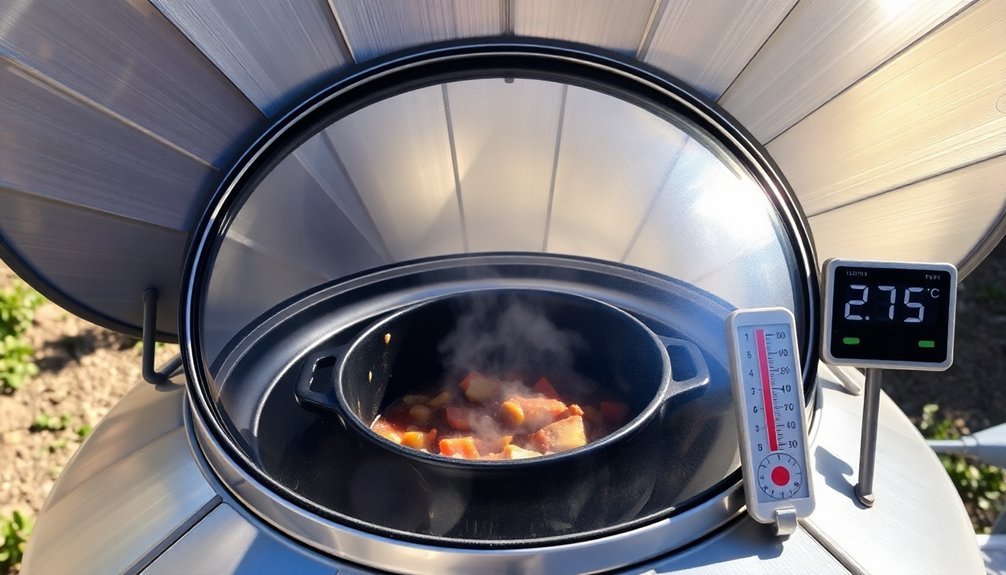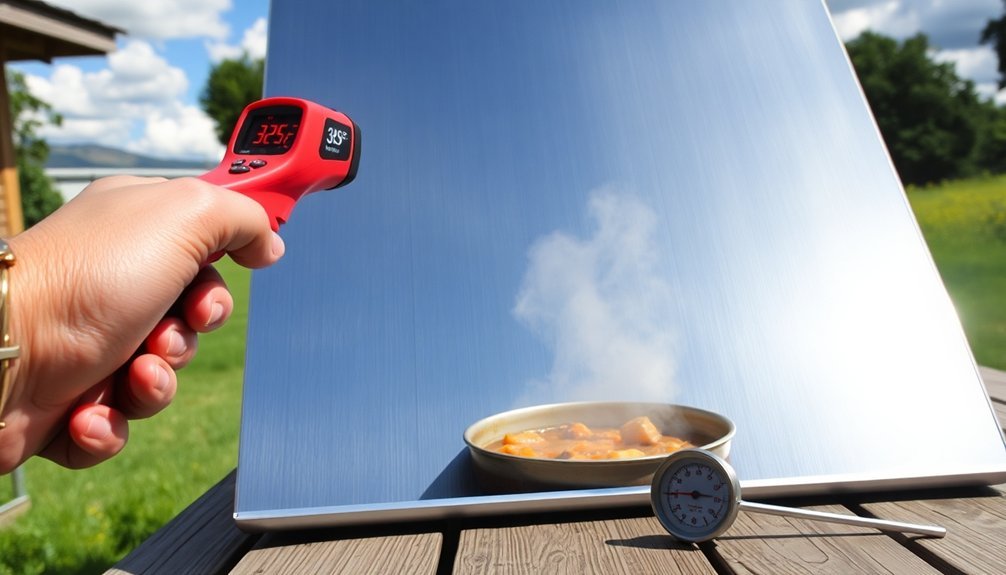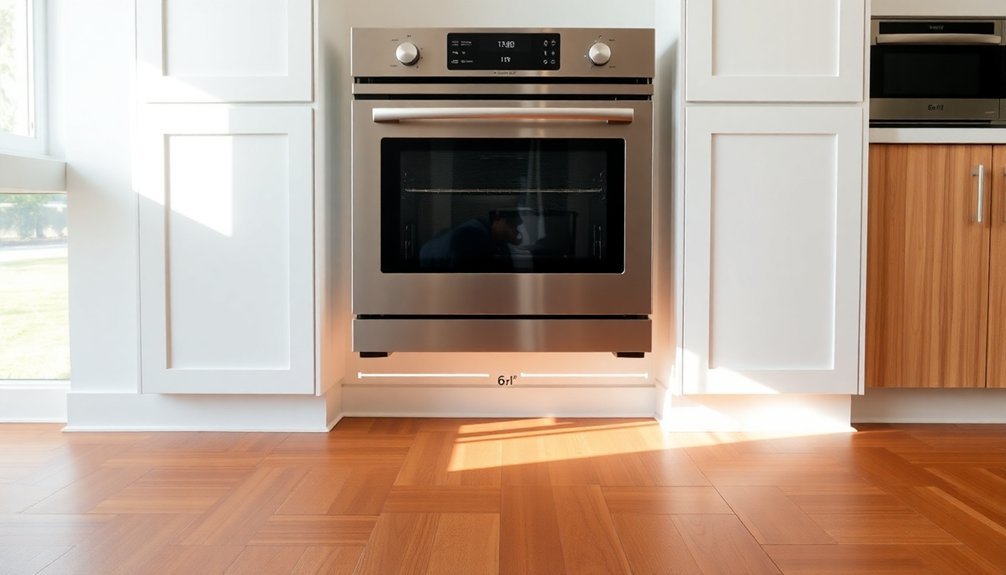You'll boost your solar cooking game with these seven marinade shortcuts. Start with a 15-minute citrus-oil blend for chicken, or try a quick soy-honey mix for instant Asian flair. Double your marinade batches – use half now and freeze half for later. For faster absorption, pierce your meats and use resealable bags to maximize coverage. Keep marination times short in hot weather: 30 minutes max for seafood and up to 4 hours for chicken. Combine yogurt with spices for a speedy tandoori effect, or mix balsamic and honey for a sweet-tangy kick. These time-saving techniques are just the beginning of your sun-powered cooking journey.
Day-Before Marinade Prep Tips

When preparing marinades a day ahead, you'll save time and enhance flavors by following a few key steps.
Start by selecting your acidic component, like wine or citrus juice, and combine it with a high smoke point oil such as peanut or canola. Add salt strategically based on your marinating timeline – either for quick marinades under an hour or longer ones over 24 hours.
Blend your ingredients thoroughly in a blender for smooth consistency, ensuring the flavors are bold and well-balanced.
Don't shy away from intense seasoning, as the flavors will mellow during marination. Store your marinade in a non-reactive container like glass or food-grade plastic.
Remember to taste and adjust before adding it to your protein, and keep a portion separate if you plan to use it for basting later.
Spice Blends for Solar Success
While solar cooking presents unique challenges, mastering spice blends can transform your outdoor culinary experience.
You'll want to balance your spices using the 1:1:1 ratio of top, middle, and base notes, or adjust to 3:2:1 when you're craving brighter flavors. Using a black absorber plate will help intensify your spices' flavors through better heat retention.
Select heat-tolerant spices like cumin and black pepper that won't lose potency in your solar cooker. Pre-mix your blends in jars before heading outside, and consider grinding whole spices for maximum freshness.
For a foolproof venison stew, combine cumin, garlic salt, black pepper, and warm spices like cloves and nutmeg. When cooking vegetables, layer oregano, basil, and paprika with onions and garlic.
Remember to time your spice additions carefully – you don't want high temperatures to burn away those carefully crafted flavors.
Quick Marinades Under Thirty Minutes

Need a delicious marinade but short on time? You'll love these quick marinade solutions that work in just 15-30 minutes. Start with a balanced mix of acid (like citrus or vinegar), fat (such as olive oil), salt, and bold flavors.
Try these proven combinations: blend lemon juice with garlic and herbs for a bright profile, or mix soy sauce with honey and ginger for an Asian twist.
For best results, whisk your ingredients first, then place your food in a resealable bag with the marinade. You can speed up the process by massaging the meat or using a needle tenderizer.
Remember that chicken and meat need at least 15 minutes, while seafood shouldn't marinate longer than 30 minutes. Keep it simple and don't overload with too many competing flavors.
Double Duty Marinades
Smart cooks know the power of double duty marinades – mixtures that not only flavor your food but also serve as delicious dipping sauces.
You'll want to combine acidic elements like lemon juice and vinegars with olive oil, then add flavor enhancers such as garlic, mustard, and Worcestershire sauce. Don't forget a touch of sweetness from honey or brown sugar. The phytochemical compounds in these ingredients provide important health benefits, especially when grilling meats.
These versatile marinades work wonders on chicken, pork, steak, shrimp, and even hearty vegetables.
Simply mix your ingredients in a bowl or mason jar, then divide the mixture – use one portion for marinating and reserve the rest.
When you're ready to serve, heat the reserved marinade until it thickens into a perfect dipping sauce.
Remember to discard any marinade that's touched raw meat and always use fresh portions for serving.
Temperature-Based Marination Times

When you're dealing with hot summer days, cut your usual marination times in half and keep a closer eye on proteins to prevent over-curing.
You'll get the best results in your refrigerator by following specific timing guidelines: 4-24 hours for pork, 2-24 hours for beef, and just 15-30 minutes for seafood. To maximize flavor absorption, remember to pierce the meat before applying your marinade.
For outdoor prep using solar power, stick to short marination windows of 15-30 minutes, and always keep your food in a shaded, cool spot to maintain food safety.
Hot Weather Speed Tips
Hot summer days demand special attention when marinating meats, especially since room temperature marination can be risky.
You'll want to work quickly and deliberately to maximize flavor while maintaining food safety.
When the temperature soars, follow these speed-marinating tips:
- Score or pierce your meat's surface before marinating – this helps the marinade penetrate more effectively even during shorter marination times.
- Add a mixture of oil and dairy (like yogurt) to your marinade for faster tenderizing while keeping the meat moist.
- Limit room temperature marination to no more than one hour, then transfer to the refrigerator if you need more time.
Refrigerator Timing Guidelines
Proper refrigeration timing makes all the difference between a safely marinated meal and a potential food hazard. You'll need to keep your meat below 40°F in the fridge, ideally at 37°F, to prevent harmful bacterial growth.
For quick marinades under an hour, you can work at room temperature. However, anything longer requires refrigeration. Here's your timing guide: seafood needs just 15-60 minutes, while chicken and lighter meats can marinate between 2-24 hours.
If you're working with denser cuts like pork or steak, you can extend the time up to 24 hours or longer.
Remember to place your marinating container on the bottom shelf to prevent drips, and always use non-reactive containers like glass, ceramic, or sealed plastic bags.
For food safety, don't baste with used marinade unless you've boiled it first.
Optimal Solar Prep Times
Temperature plays a significant role in how quickly marinades work their magic. When you're planning to marinate meat in warmer conditions, you'll need to adjust your timing to prevent over-tenderization and maintain food safety.
Always keep your marinating proteins refrigerated, even if you're preparing them for solar cooking later.
For temperature-based marination success, follow these essential timings:
- Thin cuts like chicken breasts should stay in marinade for 30 minutes max in warm conditions.
- Tougher cuts like pork roasts can handle 2-3 hours even in higher temps.
- Delicate proteins like fish need just 15-30 minutes to avoid becoming mushy.
Remember that acidic marinades work faster in warmer temperatures, so reduce your usual marination time by about half when preparing for solar cooking methods.
Freezer-Ready Solar Cooking Marinades
Whether you're planning ahead or maximizing your solar cooking efficiency, freezer-ready marinades offer a convenient way to prepare delicious chicken while harnessing the sun's energy. Stock up by preparing double batches of sun-friendly marinades and storing them in airtight zipper bags for up to 6 months.
| Marinade Type | Best Solar Cooking Features |
|---|---|
| Sundried Tomato | Heat-stable, intensifies flavor |
| Balsamic Vinaigrette | Caramelizes well in sun |
| Green Goddess | Herbs infuse during slow cooking |
Choose marinades with olive oil, lemon juice, and garlic for best results. While sticky BBQ and herbal blends work great, avoid yogurt-based marinades as they'll separate when frozen. Confirm your chicken is fully coated before freezing, and when you're ready to cook, thaw it overnight in the fridge or use cold water for quicker preparation.
Speedy Solar Marinade Formulas

Looking for quick and efficient solar marinade recipes? You'll love these time-saving formulas that pack maximum flavor in minimal time.
Combine acidic ingredients with oils and spices to create powerful marinades that work fast.
- Mix lemon juice, olive oil, and Herbs de Provence for a classic blend that tenderizes chicken in just 1 hour.
- Combine soy sauce, olive oil, and garlic for an Asian-inspired marinade that penetrates meat quickly.
- Whisk yogurt with ginger-garlic paste and tandoori spices for a rapid-action Indian-style marinade.
For best results, confirm your meat is fully covered and marinate at room temperature to speed up the process.
Use a ziplock bag to distribute the marinade evenly, and remember to preheat your solar cooker while the meat's marinating.
You'll get delicious results without the long wait.
Frequently Asked Questions
Can I Reuse Leftover Marinade After Raw Meat Has Been in It?
You shouldn't reuse marinade that's touched raw meat unless you boil it first at 165°F. To be safe, either boil the used marinade thoroughly, or set aside some fresh marinade before adding meat.
Why Do Some Marinades Make My Food Mushy or Tough?
Your food gets mushy from enzymes in fruit marinades working too long, while acidic marinades can make meat tough if they're too strong or you marinate too long. It's all about time and concentration control.
How Do Solar-Marinated Foods Compare to Traditionally Grilled Dishes in Taste?
You'll find solar-marinated foods have richer, deeper flavors than traditional grilling since they've had more time to absorb marinades. You'll notice they're usually juicier too, thanks to the slower, more thorough marination process.
Should I Adjust Marinade Ingredients Based on Different Weather Conditions?
You don't need to adjust marinade ingredients for different weather conditions. Your basic marinade ratios of acid, fat, and seasonings remain constant. Just guarantee proper food safety through temperature control during marination.
Can I Use Metal Containers for Marinating in Solar Cooking?
You can safely use metal containers for solar cooking marinades, but avoid aluminum with acidic ingredients. Choose heat-safe, food-grade metals that fit your solar oven, and make certain they're properly covered while cooking.
In Summary
You'll find these seven marinade shortcuts transform your solar cooking into a convenient and flavorful experience. Whether you're batch-prepping freezer marinades or whipping up a quick 30-minute blend, these techniques work with the sun's natural heat to enhance your dishes. Don't forget to match your marination time to the day's temperature forecast. With these methods, you're ready to make the most of your solar cooker.





Leave a Reply